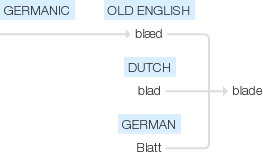Blade
Old English blæd ‘leaf of a plant’ (also in blade (sense 2 of the noun)), of Germanic origin; related to Dutch blad and German Blatt .
wiktionary
From Middle English blade, blad, from Old English blæd(“leaf”), from Proto-West Germanic *blad, from Proto-Germanic *bladą, from Proto-Indo-European*bʰl̥h₃-o-to-m, from *bʰleh₃-(“to thrive, bloom”)
See also West Frisian bled, Dutch blad, German Blatt, Danish blad, Irish bláth(“flower”), Welsh blodyn(“flower”), Tocharian A pält, Tocharian B pilta(“leaf”), Albanian fletë(“leaf”). Similar usage in German Sägeblatt(“saw blade”, literally “saw leaf”). Doublet of blat. More at blow.
etymonline
blade (n.)
Old English blæd "a leaf," also "a leaf-like part" (of a spade, oar, etc.), from Proto-Germanic *bladaz (source also of Old Frisian bled "leaf," German Blatt, Old Saxon, Danish, Dutch blad, Old Norse blað), from PIE *bhle-to-, suffixed form (past participle) of root *bhel- (3) "to thrive, bloom."
Extended in Middle English to the broad, flattened bone of the shoulder (c. 1300) and the cutting part of knives and swords (early 14c.). The modern use in reference to grass may be a Middle English revival, by influence of Old French bled "corn, wheat" (11c.), which is perhaps from Germanic. The cognate in German, Blatt, is the general word for "leaf;" Laub is used collectively as "foliage." Old Norse blað was used of herbs and plants, lauf in reference to trees. This might have been the original distinction in Old English, too. Compare leaf (n.). Of men from 1590s; in later use often a reference to 18c. gallants and dashing rakes, but the original exact sense, and thus signification, is uncertain.
